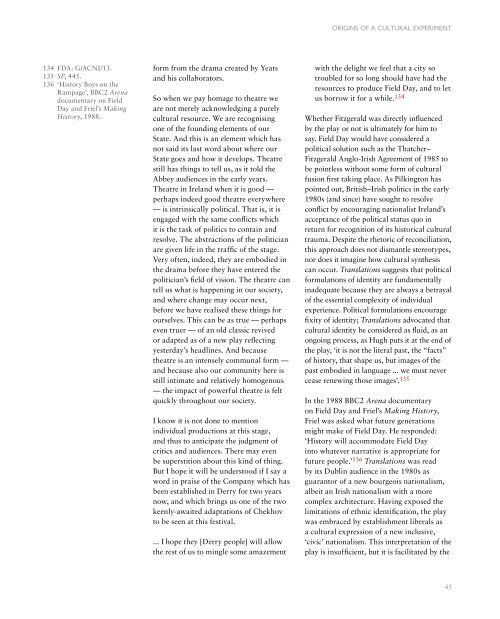cd on translations
cd on translations
cd on translations
Create successful ePaper yourself
Turn your PDF publications into a flip-book with our unique Google optimized e-Paper software.
134 FDA: G/ACNI/13.<br />
135 SP, 445.<br />
136 ‘History Boys <strong>on</strong> the<br />
Rampage’, BBC2 Arena<br />
documentary <strong>on</strong> Field<br />
Day and Friel’s Making<br />
History, 1988.<br />
form from the drama created by Yeats<br />
and his collaborators.<br />
So when we pay homage to theatre we<br />
are not merely acknowledging a purely<br />
cultural resource. We are recognising<br />
<strong>on</strong>e of the founding elements of our<br />
State. And this is an element which has<br />
not said its last word about where our<br />
State goes and how it develops. Theatre<br />
still has things to tell us, as it told the<br />
Abbey audiences in the early years.<br />
Theatre in Ireland when it is good —<br />
perhaps indeed good theatre everywhere<br />
— is intrinsically political. That is, it is<br />
engaged with the same c<strong>on</strong>flicts which<br />
it is the task of politics to c<strong>on</strong>tain and<br />
resolve. The abstracti<strong>on</strong>s of the politician<br />
are given life in the traffic of the stage.<br />
Very often, indeed, they are embodied in<br />
the drama before they have entered the<br />
politician’s field of visi<strong>on</strong>. The theatre can<br />
tell us what is happening in our society,<br />
and where change may occur next,<br />
before we have realised these things for<br />
ourselves. This can be as true — perhaps<br />
even truer — of an old classic revived<br />
or adapted as of a new play reflecting<br />
yesterday’s headlines. And because<br />
theatre is an intensely communal form —<br />
and because also our community here is<br />
still intimate and relatively homogenous<br />
— the impact of powerful theatre is felt<br />
quickly throughout our society.<br />
I know it is not d<strong>on</strong>e to menti<strong>on</strong><br />
individual producti<strong>on</strong>s at this stage,<br />
and thus to anticipate the judgment of<br />
critics and audiences. There may even<br />
be superstiti<strong>on</strong> about this kind of thing.<br />
But I hope it will be understood if I say a<br />
word in praise of the Company which has<br />
been established in Derry for two years<br />
now, and which brings us <strong>on</strong>e of the two<br />
keenly-awaited adaptati<strong>on</strong>s of Chekhov<br />
to be seen at this festival.<br />
... I hope they [Derry people] will allow<br />
the rest of us to mingle some amazement<br />
ORIGINS OF A CULTURAL EXPERIMENT<br />
with the delight we feel that a city so<br />
troubled for so l<strong>on</strong>g should have had the<br />
resources to produce Field Day, and to let<br />
us borrow it for a while. 134<br />
Whether Fitzgerald was directly influenced<br />
by the play or not is ultimately for him to<br />
say. Field Day would have c<strong>on</strong>sidered a<br />
political soluti<strong>on</strong> such as the Thatcher–<br />
Fitzgerald Anglo-Irish Agreement of 1985 to<br />
be pointless without some form of cultural<br />
fusi<strong>on</strong> first taking place. As Pilkingt<strong>on</strong> has<br />
pointed out, British–Irish politics in the early<br />
1980s (and since) have sought to resolve<br />
c<strong>on</strong>flict by encouraging nati<strong>on</strong>alist Ireland’s<br />
acceptance of the political status quo in<br />
return for recogniti<strong>on</strong> of its historical cultural<br />
trauma. Despite the rhetoric of rec<strong>on</strong>ciliati<strong>on</strong>,<br />
this approach does not dismantle stereotypes,<br />
nor does it imagine how cultural synthesis<br />
can occur. Translati<strong>on</strong>s suggests that political<br />
formulati<strong>on</strong>s of identity are fundamentally<br />
inadequate because they are always a betrayal<br />
of the essential complexity of individual<br />
experience. Political formulati<strong>on</strong>s encourage<br />
fixity of identity; Translati<strong>on</strong>s advocated that<br />
cultural identity be c<strong>on</strong>sidered as fluid, as an<br />
<strong>on</strong>going process, as Hugh puts it at the end of<br />
the play, ‘it is not the literal past, the “facts”<br />
of history, that shape us, but images of the<br />
past embodied in language ... we must never<br />
cease renewing those images’. 135<br />
In the 1988 BBC2 Arena documentary<br />
<strong>on</strong> Field Day and Friel’s Making History,<br />
Friel was asked what future generati<strong>on</strong>s<br />
might make of Field Day. He resp<strong>on</strong>ded:<br />
‘History will accommodate Field Day<br />
into whatever narrative is appropriate for<br />
future people.’ 136 Translati<strong>on</strong>s was read<br />
by its Dublin audience in the 1980s as<br />
guarantor of a new bourgeois nati<strong>on</strong>alism,<br />
albeit an Irish nati<strong>on</strong>alism with a more<br />
complex architecture. Having exposed the<br />
limitati<strong>on</strong>s of ethnic identificati<strong>on</strong>, the play<br />
was embraced by establishment liberals as<br />
a cultural expressi<strong>on</strong> of a new inclusive,<br />
‘civic’ nati<strong>on</strong>alism. This interpretati<strong>on</strong> of the<br />
play is insufficient, but it is facilitated by the<br />
45


